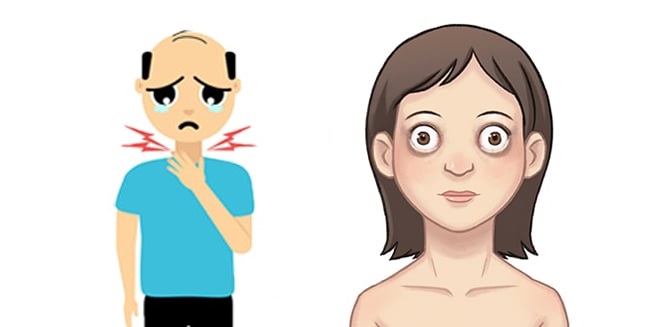Hyperthyroidism, also known as toxic goiter, is a serious health problem caused by the above-normal levels of thyroid hormones which control the metabolic rate. This leads to a very high rate of metabolism, and as a result, acceleration is seen in many bodily functions including heart rate, body temperature and digestive system. It is more common in women. If left untreated, it might be life-threatening. On the other hand, treatment usually works, and disease can either be cured or controlled. Adherence to a proper diet plan is crucial during and after treatment. Otherwise, symptom recurrence may be seen.
Table of Contents
What is hyperthyroidism (Toxic goiter)?
Hyperthyroidism develops as a result of excessive thyroid hormone production which is more than the amount body needs. Thyroid is a small, butterfly-shaped hormone producing gland which is placed on the anterior part of the neck. It is responsible for the production of two main hormones, thyroxine (T4) and triiodothyronine (T3) controlling the way the cells use energy.
These hormones affect body temperature and heart rate as well as fat/carbohydrate use and protein production. Excessive production of these hormones may result in serious problems requiring treatment.
Causes of hyperthyroidism
Main causes of hyperthyroidism include Graves’ disease, thyroid nodules and thyroiditis. Rarely, it may be caused by a benign pituitary gland tumor which is located at the base of the brain. Consumption of iodine in abundant amounts or using excessive amounts of thyroid hormone medication also cause hyperthyroidism.
Hyperthyroidism and Graves’ disease
Graves’ disease is an autoimmune disease in which the immune system stimulates the thyroid gland to produce excessive amounts thyroid hormone. It is the most common cause of hyperthyroidism. The first step in the treatment of Graves’ disease is to treat hyperthyroidism. Plasma T3 and T4 hormone levels are returned to normal using medications. Symptoms may resolve completely and the disease may be cured in some patients after the normalization of the hormone levels.
Overactive thyroid nodules
The abnormal local tissue in the thyroid gland gets enlarged due to diseases like toxic adenoma, toxic multinodular goiter or Plummer’s disease. This abnormal tissue escapes from mechanisms controlling the thyroid gland and causes thyroid hormone production even without the stimulation of thyroid stimulating hormone (TSH).
Thyroiditis
Thyroiditis is the inflammation of the thyroid gland. Inflammation causes leakage of the excessive thyroid hormone stored in the gland into blood circulation. Hyperthyroidism developing via this way may last up to 3 months. After that, as the hormone store runs out, thyroid functions decrease below normal. This is called hypothyroidism.
Normal gland functions are usually restored within 12-18 months, however, sometimes it might be permanent. Different types of thyroiditis cause hyperthyroidism, and then result in hypothyroidism.
- Subacute thyroiditis: In this type of thyroiditis, thyroid gland is sore, inflamed and enlarged. While the exact cause remains to be unknown, it is caused by a bacterial or viral infection.
- Silent lymphocytic thyroiditis (Postpartum thyroiditis): This type of thyroiditis is characterized by an autoimmune thyroid inflammation which develops in postpartum period and usually resolves spontaneously.
- Hashimoto’s thyroiditis: Hashimoto’s İs the chronic autoimmune inflammation of the thyroid. In a small percent of the patients, it presents with hyperthyroidism symptoms, definitely causes hypothyroidism later, and requires lifelong treatment.
High iodine levels in body
Thyroid gland use iodine to produce thyroid hormone. The amount of iodine used affects the amount of thyroid hormone produced by the gland. In some individuals, consuming high levels of iodine may result in excessive thyroid hormone production by thyroid gland.
Some medications and cough syrups may contain abundant amount of iodine. An example of this is the heart medication, amiodarone. Additionally, seaweed and seaweed-based dietary supplements contain high levels of iodine.
Using thyroid hormone medications for a long period of time
Using medications for the treatment of hypothyroidism for a long time may result in greatly elevated thyroid hormone levels. Certain other medications may interact with thyroid hormone medication to increase the hormone levels.
Symptoms of hyperthyroidism
- Visibly enlarged thyroid gland (goiter)
- Increased heart rate (tachycardia) and blood pressure (hypertension)
- Palpitation due to abnormal heart rhythms (arrhythmia)
- Weight loss despite increased appetite
- Distemper and anxiety
- Shaky hands
- Excessive sweating and decreased tolerance to heat
- Difficulty with sleeping
- Fatigue and muscle weakness
- Overactive state
- Increased bowel movements
- Changes in menstrual regularity in women
- Splitting and thinning hair
- Gynecomastia (breast tissue enlargement in men)
If the patient has subacute thyroiditis, the gland might be sensitive and sore. Symptoms are associated with the accelerated body functions independently of the reason. In older patients, symptoms like increased heart rate, sensitivity to heat and getting tired during regular activities are not observed.
These individuals may present with decreased appetite, and wish to avoid other people. And this might be confused with depression.
Diagnosis of hyperthyroidism
Medical history, physical examination and blood tests are used for diagnosis.
- Medical history and physical examination: Usually, thyroid gland enlargement, increased heart rate, sweating status on the skin, shaky finger, overactive reflexes and ocular changes are checked.
- Blood tests: The diagnosis can be confirmed using blood tests measuring thyroxine and thyroid stimulating hormone (T4). High thyroxine levels and below-normal TSH levels indicate an overactive thyroid. TSH level is important as it is the hormone stimulating the thyroid gland to produce more thyroxine. These tests are especially important for older adults without the conventional symptoms of hyperthyroidism.
If you are using a Vitamin B supplement such as biotin, thyroid blood tests may give false results. If you are using biotin or multivitamin supplement, inform your doctor and stop taking biotin 12 hours before the blood sampling.
If blood tests confirm the presence of hyperthyroidism, some of the following tests may be used to determine the cause of the overactive thyroid:
- Radioactive iodine uptake test; a small dose of radioactive iodine is taken and the amount of iodine uptake by thyroid is checked approximately 24 hours later. A high level of radioactive iodine uptake indicates excessive thyroxine production by the thyroid gland. The most probable cause is Graves’ disease or overactive thyroid nodules. The presence of hyperthyroidism and low radioactive iodine uptake indicates leakage of thyroxine which is stored in the gland into the blood circulation.
- Thyroid scintigraphy shows whether the nodule is overactive or not. Moreover, it might be helpful in the assessment of Graves’ disease.
- Thyroid ultrasound might be better in detecting the thyroid nodules than the other tests and does not expose the patient to radiation.
Treatment of hyperthyroidism
Medication, radioactive iodine and surgical methods are used for the treatment of hyperthyroidism. Treatment is decided based on the cause of hyperthyroidism. Factors affecting the decision of the treatment method include age, physical status and the severity of the disease.
Radioactive iodine treatment
It is commonly used usually in individuals requiring faster treatment. Radioactive iodine is given via oral route to destroy a part of the thyroid gland and most of this is absorbed by the thyroid gland. Symptoms usually improve within a few months. Almost everybody who receives radioactive iodine treatment develops hypothyroidism later on due to damage to the cells producing thyroid hormone.
However, it is easy to treat hypothyroidism, and it causes less health problems than hyperthyroidism. Patients with hypothyroidism can get the condition under control using daily thyroid hormone medications.
Excretion of the excess of the radioactive iodine may take weeks or even months. The individual under treatment should avoid infants and children for 2-4 days after the treatment and should sleep in a separate bed. Pregnancy should be avoided for approximately 6 months.
Hyperthyroidism medications
- Anti-thyroid medications: They prevent excessive hormone production by the thyroid gland and provides a gradual improvement in the hyperthyroidism symptoms. After the initiation of the treatment, the symptoms improve within weeks to months. The treatment takes at least 1 year, however, usually longer. In patients who did not benefit from medical treatment, antithyroid medications are used to prepare the patient for radioactive iodine treatment or operation. In pregnant or breastfeeding women, usually antithyroid medication treatment is preferred. Because this method is safer for the baby compared to the other methods.
Methimazole and propylthiouracil are the most commonly used antithyroid medication. Both medications may cause liver damage, though, this is rare. As propylthiouracil carries a higher risk for this, it is usually preferred in cases where methimazole cannot be tolerated. In a few individuals who are allergic to these medications, skin rash, urticaria, fever or joint pain may be seen. Additionally, the individual becomes more susceptible to infections.
- Beta-blockers do not block thyroid hormone production, however, may provide improvement in many of the hyperthyroidism symptoms such as shaking, increased heart rate and irritability until other treatments show their effect. Therefore, regardless of the used treatment method, this type of medications can be used in addition to the treatment. Beta-blocker medications include propranolol, atenolol, metoprolol and nadolol. In general, they are not recommended for patients with asthma. Side effects include fatigue and sexual dysfunction.
How long does the treatment of hyperthyroidism take?
Symptom improvement is observed within a few weeks after treatment initiation. The treatment takes at least 1 year, usually longer. As hypothyroidism occurs in treatment methods reducing the hormone level below normal or eliminating it completely.
Hyperthyroidism operation (Thyroidectomy)
Surgical methods are rarely used for the treatment of hyperthyroidism. Thyroidectomy is a method used for individuals with cancerous or greatly enlarged goiter, who are allergic to medications or experience serious side effects.
Thyroid gland is completely or partly removed by operation. When a part of the gland is removed, hormone level might return to normal. In case of complete removal or in case of inadequate hormone production despite partial removal, hypothyroidism is observed. In this case, lifelong thyroid hormone supplement is necessary.
The risks of the operation include damage to vocal cords and parathyroid glands (the glands controlling the blood calcium level). In case of damage to or removal of the parathyroid glands, medications might be necessary to keep the blood calcium level within normal levels. In addition to these, there are also risks of infection and bleeding as with all operations.
Does hyperthyroidism treatment cause weight gain?
As metabolic rate returns to normal with hyperthyroidism treatment, weight gain is possible. Therefore, the patient should stick to a balanced diet program.
Herbal treatment of hyperthyroidism
Herbal methods can be used for the treatment of hyperthyroidism. However, the cause, severity and inter-individual variability of the disease should not be ignored, and additional supplements and herbal cures must be used according to the doctor’s recommendations.
- St. John’s wort: It is an herb which is used to treat heart and lung disorders from past to present. Some studies have shown that it reduces the functioning of the thyroid gland. However, it is not clear whether it is an effective treatment for hyperthyroidism.
- Melissa: Being from the mint family, Melissa can be used for the treatment of Graves’ disease as it reduced thyroid stimulating hormone (TSH). However, the studies on this herb are lacking. You can use Melissa as tea or supplement. A glass of Melissa tea consumed before sleeping will also help with its calming effect.
- Frankincense and myrrh oil: While the studies are lacking, certain essential oils may reduce the stress level of the body and provide improvement in thyroid functions. Drip 2 drops of frankincense oil daily on your palate, and apply 2-3 drops of myrrh oil daily directly on the thyroid region.
Nutritional management of hyperthyroidism
Hyperthyroidism is a diet-related disease. Therefore, diet should be considered as a part of treatment in patients with hyperthyroidism. Nutritious foods and supplements which boost the immune system, have antioxidant properties, contain calcium and sodium; and healthy oils should be consumed.
Foods of carbohydrate group should be chosen from the ones with low glycemic index. As medications cause weight gain, the patient should avoid starchy and sugared foods.
Hyperthyroidism diet plan
- Stick to a diet plan consisting of 3 main meals and 3 snacks.
- Use iodine-free salt.
- Eat a bowl of probiotic bowls daily.
- Daily oil and protein consumption should not be more than your need. Use olive oil, and eat more white meat than red meat.
- Vegetables and fruits containing vitamins A, C, E have antioxidant properties that boost the immune system. As vitamin A deficiency is seen in this disease, plenty of yellow and green vegetables and fruits including carrot, pepper and zucchini can be consumed.
- Patients who do not have severe hormone levels can consumed oily seafood rich in omega 3. Patients who require severe iodine restriction can use omega 3 as supplement.
- Avoid caffeine-containing beverages such as tea, coffee and coke.
- Limit your milk, cheese, seafood, purple cabbage, radish, and dried nuts and fruits consumption.
- Drink plenty of water as dry mouth is a common symptom.
- Dietary supplements: You can use omega-3, L-carnitine, Thiamine, plant sterol and other vitamins of group B supplements.
Does hyperthyroidism cause other health problems?
If hyperthyroidism is left untreated, weight loss continues. Bone thinning (osteoporosis) occurs. Life-threatening serious conditions such as cardiac rhythm problems, heart failure and thyroid storm may be seen. Hyperthyroidism treatment usually results in hypothyroidism, thereby, requires daily thyroid hormone replacement.
Hyperthyroidism during pregnancy
During pregnancy, hyperthyroidism is usually seen due to Graves’ disease. Hyperthyroidism during pregnancy may cause abortion, premature delivery, low birth-weight and growth retardation, stillbirth, preeclampsia known as pregnancy hyperthyroidism, and heart failure in the mother.
Moreover, it leads to an over-functioning thyroid gland in the baby. Antithyroid medications are used for the treatment, however, these should be used with caution in the first trimester. If necessary, beta-blocker medications can also be used.
Recommendations for hyperthyroidism patients
- Exercise regularly.
- Avoid tobacco products.
- Change your dietary habits, and seek help from a dietitian or your doctor if necessary. Glycemic index diet is a beneficial diet method for hyperthyroidism.
- When starting a new medication, tell your doctors the medications you use for hyperthyroidism.
- If you have Graves’ disease, use sunglasses to protect your eyes from the sun or wind. Elevate head side of your bed. This reduces pressure in your eyes and may help reduce the swelling. Avoid eye dryness by using eye drops.
- Check your thyroid hormone level at least annually. Fro more:> Hyperthyroidism




